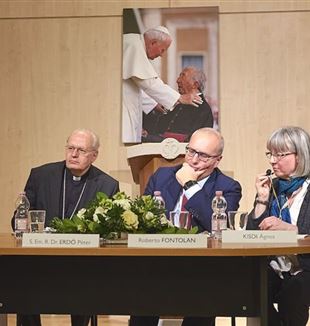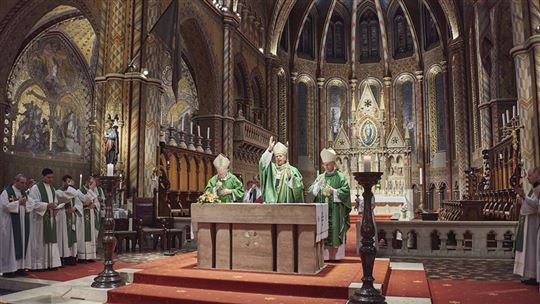
Hungary: "We are the traces of Christ"
In Budapest, the Mass for the anniversary of Fr. Giussani's death, celebrated by Cardinal Erdő, became an opportunity to present "Generating Traces in the History of the World”. And to discover that we are "a spectacle for ourselves".In Budapest, the Mass celebrated for the anniversary of Fr. Giussani's death was also an occasion to present the text of School of Community, Generating Traces in the History of the World by Fr. Giussani, Stefano Alberto and Javier Prades, recently published in Hungarian. It was an important gesture for the CL community in Hungary, who lived it, and its preparation, as an opportunity to experience that "gladness, which is the human glory of Christ", as Fr. Giussani said in St. Peter's Square in May 1998.
The anniversary Mass has been celebrated for years. And we are not new to public gestures or book presentations either. In a certain sense, we have already been "put to the test". At least, that is what we thought when we began preparations for the evening of Friday, February 7. We needed a list of people to invite, buy refreshments, organize the book counter, contact the press, prepare the hall, the music…In short, all the things we "already know".
But instead ... It was very clear from the beginning that there can be nothing mechanical or obvious in what we do. On the contrary, it was touching to see the availability and involvement not only of the members of our community, about thirty people, but we witnessed also the generosity of many other friends and acquaintances.
The first of these was Cardinal Péter Erdő, Primate of Hungary, who had met Fr. Giussani in person and who, in the last thirty years, has already celebrated Mass many times in his memory. Then, the generosity of Roberto Fontolan, head of the CL International Center in Rome, who came especially for the presentation of the book. And the Apostolic Nuncio, Michael August Blume SVD, together with the Archbishop of Eger, Csaba Ternyák, wanted to be present at the gesture.
There was a flourishing of unity and generosity also within the community, each of us was eager to create a beautiful gesture to make known what is dear to us, to share with everyone our joy of belonging to this history, to this charism. We were a spectacle for one another.
During the presentation, at the beginning of his speech, Cardinal Erdő stressed how Generating Traces in the History of the World has an important historical-theological vision: unlike Teilhard de Chardin's theory of evolution, according to which history is a progressive increase of good and decrease of evil, Fr. Giussani presents the theology of a dramatic history where, following Augustinian thought, it is not simple progress that guarantees development, but the presence of Jesus, because "wheat and tares grow together".
Roberto Fontolan, in turn, pointed out that the relevance of the book comes from various factors: the importance of the category of the event, of the relationship between faith and reason, and of mercy, a concept that links and permeates the chapters and is described as "the last word on history".
When asked what it means to "generate traces", Erdő immediately answered: "We are the traces of Christ, us Christians". We are the most concrete trace of Christ in history, the Church that remains in the world. Even Christ's resurrection would have been reduced to a miraculous episode of the past without those people who have recognized, and recognize today, His presence, two thousand years later.
Fontolan, questioned on the same subject, recounted the story of the Palestinian Christians of Bethlehem, reported in Traces last December, who were struck by meeting some people from Italy who not only brought humanitarian assistance, but offered their friendship: "Only a changed humanity can generate traces".#GeneratingTraces